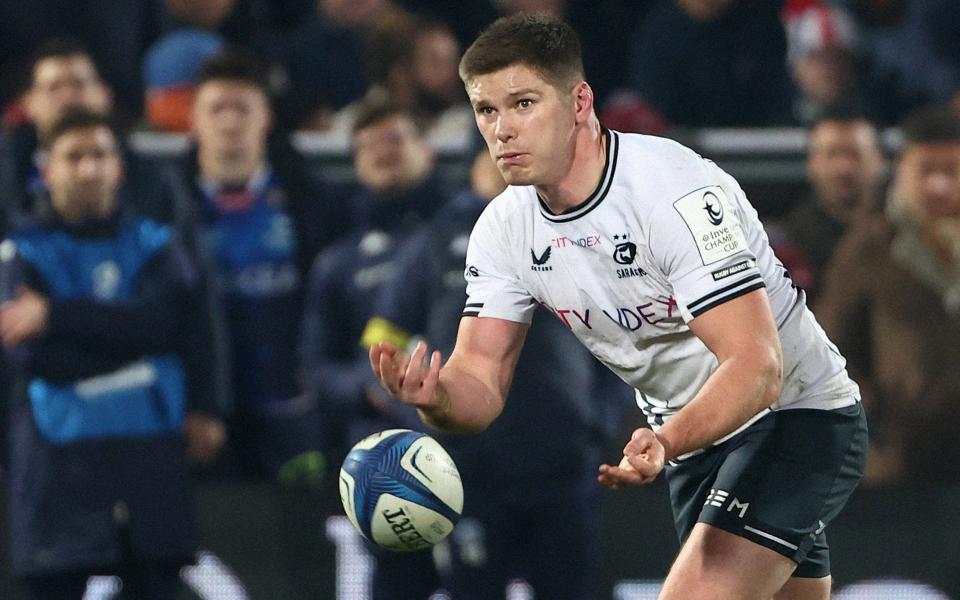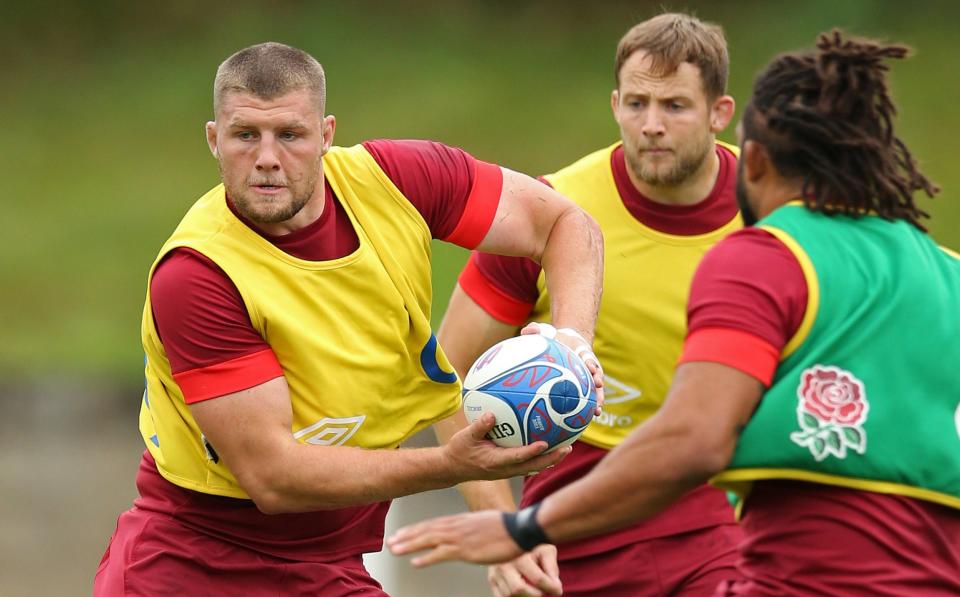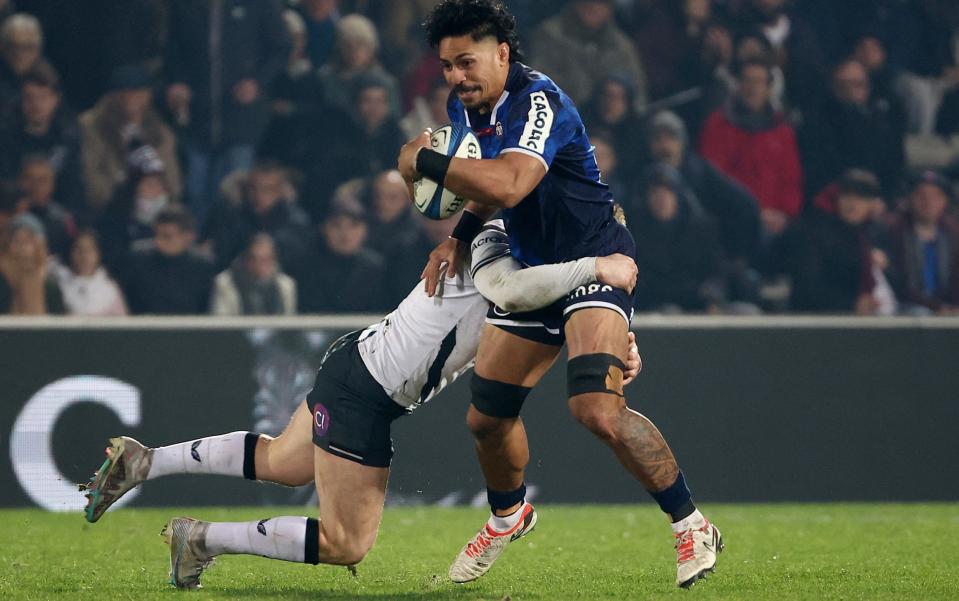Three areas Saracens are struggling with as end of an era approaches

Even the many who resent Saracens, and will be indulging in some schadenfreude right now, would not envision them shipping 50 points in their wildest dreams. Dogged resilience has been a pillar of the club’s success for more than a decade. Defeats such as the one Saracens suffered in Bordeaux, at the hands of Matthieu Jalibert and friends, have been mighty rare.
Sunday evening’s 55-15 loss was a record-breaking low that has also set up a defining fortnight for Mark McCall and his squad. To stay in the hunt for trophies, the rot must stop immediately.
We can talk about regression to the mean and add a degree of context to Saracens’ slump. Five of their seven losses in the Premiership and Champions Cup have occurred at Sandy Park, Loftus Versveld, AJ Bell Stadium, Welford Road and now Stade Chaban-Dalmas. Winning at any of those places would have been impressive. Equally, though, they seem to be caught in a multi-faceted spiral.
Owen Farrell’s situation and the end of an era
The World Cup crossover, as well as any hangover, was always going to be tricky for Saracens given their need to juggle resources after contributing 13 internationals from five different nations to the tournament. A 65-10 loss to Exeter Chiefs on the opening day of this Premiership campaign reinforced as much.
Subsequent distractions regarding their skipper, first when Owen Farrell announced his England hiatus and then when news broke of a potential move to Racing 92, have exacerbated matters. They have also reinforced how Saracens are facing a significant period of transition, something McCall admitted prior to their 19-10 loss to Leicester Tigers.
As well as Farrell, two more stalwarts, Mako and Billy Vunipola, will probably leave the club this summer. A decent contingent of first-team players are due to depart as well. In the past, Saracens have managed the inevitable churn well, maintaining momentum despite bidding farewell to club legends such as Brad Barritt and Richard Wigglesworth. Even so, this batch of comings and goings will be challenging.

For a start, it would take extraordinary powers of focus for players not to be affected. Before the weekend, Farrell’s form had been mixed. Against Tigers in the East Midlands, for instance, he coughed up an interception that made a gift of a try to Dan Kelly but also directed some slick attack, both from first-phase strikes and with clever kick-passes. Sunday was more difficult.
Farrell threw two errant passes early on – one bouncing off Maro Itoje’s head – before kicking out on the full. He was walked back 10 metres for questioning referee Chris Busby and later, in a fraught second half, his charged-down chip brought about an eighth Bordeaux try through Pablo Uberti.
At 32, Farrell still has plenty to offer and would surely be refreshed by a change in environment. He was commanding during last season’s Premiership final and for most of the World Cup semi-final against South Africa. Understandably, though, he currently looks as though his mind is cluttered. And, because of his influence, that is hurting Saracens.
Saracens without Farrell, Mako and Billy would be a vastly different place that would require other leaders to assert themselves and a new fly-half to be recruited. That said, with Ben Earl among those re-signing and Phil Brantingham and Rhys Carré thought to be coming in, they will have plenty of quality for the new era. Navigating an awkward interim, after other clubs such as Bath, Northampton Saints and Exeter have so obviously consolidated, will not be easy. Bath and Northampton have already won in north London this season.
Concentrated casualty list
Injuries to important individuals are tough enough to deal with and Saracens have been noticeably less assured without Tom Willis and Alex Lozowski. Even in a brief period since arriving in August, the former had been close to nailing down a spot in a strong front-line back row. Willis will return from knee surgery in March. Lozowski, a flinty and athletic midfielder, faces a longer lay-off due to a ruptured anterior cruciate ligament. Callum Hunter-Hill, who has developed into a mobile and imposing lock, is another poised to be fit after the Six Nations.

By then, Saracens could be facing an uphill battle to reach the domestic play-offs. Arguably more damaging has been the concentration of front-row injuries. At loosehead prop, Eroni Mawi, Ralph Adams-Hale and Tom West have all faced time out, with Mako Vunipola currently suspended as well. Kapeli Pifeleti and Tom Woolstencroft have not been able to offer back-up at hooker. On the tighthead side, Marco Riccioni and Ollie Hoskins, the latter signed as injury cover for Alec Clarey in the first place, have been unavailable. Previously able to rely on the scrum as a pressure-reliever, Saracens have been under the pump.
Bleeding scrum penalties and tries
When sides are playing well, different facets of their game look in sync. Saracens seem disconnected, their chain of performance broken most often by a steady stream of scrum penalties – most decisive at Sale and Leicester – and porous defence. Curiously, they appeared as steely as ever at the Twickenham Stoop on November 18 when Harlequins were dismissed 38-10. However, even across subsequent bonus-point home wins over Bristol Bears and Connacht, Saracens shipped a combined total of 67 points; a sure-fire sign that their attack has had to cover up other deficiencies. This is difficult to remedy during a marathon block of games.
In Bordeaux, Saracens conceded three quick tries and found themselves 19-3 behind before the end of the first quarter. After missing a chance to pull back a try on the verge of half-time, when Logovi’i Mulipola was held up on the fringes of a breakdown by the superb Yoram Moefana, they needed to open up and push the envelope to chase a free-running comeback. That only caused more problems, because Bordeaux are kings of the counter and feast on transition chances. Official statistics note that Saracens completed 64 tackles and missed 33; a ghastly ratio. Romain Buros and Louis Bielle-Biarrey were the chief tormentors, beating 13 defenders between them. Damian Penaud racked up a whopping 142 metres with ball in hand. Bordeaux’s blend of speed and muscle, coordinated by a dancing Jalibert, was overwhelming.

Saracens cannot simply limp to the Six Nations break. They have a week to regroup and land some counterpunches of their own. Beat Lyon handily and they will keep alive the dream of a local Champions Cup final at Tottenham, which would represent a fitting last dance for any leavers. On January 27, Exeter visit StoneX Stadium. Rob Baxter’s men will relish the opportunity to pile on the pain for Saracens.
Sitting sixth on the Premiership ladder, their title defence is wobbling. They have overcome choppy patches previously and pushed on to win silverware. Doing so this time would rank as a serious achievement for McCall.

 Yahoo Sport
Yahoo Sport 





































